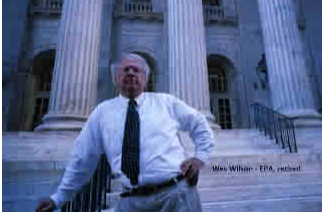Part One of a Four Part Series by Wes Wilson, former Environmental Engineer for the EPA.
Earlier this month I had an unusual request. Our nephew in Pennsylvania is a middle school principal and one of the teachers there has a 9th grade science class that decided to study fracking. They presented me with six challenging questions. Here are their questions and my responses.
- Do you support the idea of fracking? Why or why not?

Photo Credit: Hunger Free Colorado
I do not support fracking because fracking:
1) harms the climate, 2) can pollute local ground water and release toxic air emissions, 3) consumes vast quantities of clean water, and 4) because local governments are forced to accept this large scale industrial development in their communities.
Fracking, specifically high volume slick water hydraulic fracturing, has become the main way to supply natural gas and oil in the United States. Hydraulic fracking uses large volumes of water in a slurry of toxic chemicals[1] containing small sand particles. Once the rock behind the well bore is broken by the high fluid pressure, the sand contained in the fracking slurry holds the fissure open so that natural gas can flow. The excess gases that are burned off following drilling and fracking in North Dakota are so large that it can be seen from space.[2]
The oil and gas industry has developed a clever way of combining horizontal drilling with fracking to produce vast amounts of natural gas and oil. See the following animation on YouTube to get an understanding of how horizontal drilling and fracking works.[3] It’s been claimed that the computer-controlled drilling bit is so accurate that if there was a small home a mile or two underground, drillers could enter the front door and exit out the back door.
The main reason I not support fracking is because it produces a fossil fuel which harms the climate. The burning of natural gas in a power plant does produce 50% less carbon dioxide (CO2), a greenhouse gas, than does burning coal. However, producing natural gas allows vast quantities of methane to leak into the atmosphere. Methane is even more effective at trapping solar heat than CO2. Fracking has unlocked perhaps a century’s worth of natural gas while making a false promise of reducing greenhouse gases. So, fracking keeps us from making the needed investments in renewable energy sources. If there is a safe exit from the human-induced climate disaster, renewables and an energy diet are the only escape hatches available to us.
The environmental threat of climate change is the greatest challenge ever presented to humanity. In his election night speech last November, President Obama said: “We will respond to the threat of climate change, knowing that the failure to do so would betray our children and future generations.” However, the President and his Administration have supported the rapid development of fracking throughout the country. The President declared in his second inaugural speech that: “We have a supply of natural gas that can last America nearly 100 years.” While this technology of horizontal drilling combined with fracking is capable of providing such a long term natural gas supply, by doing so, the rate of global warming will be vastly accelerated.
In a debate this month in New York featuring Dr. Tony Ingraffea of Cornell University, the professor explained the recent scientific studies about leaking of methane from fracking and how that could cause an acceleration of global warming perhaps to a tipping point in just the next 30 years.[4] Dr. Ingraffea and his colleague Robert Howarth of Cornell wrote the world’s first paper on methane leaks from oil and gas drilling in 2011. Their data showed a leak rate between 3.6 to 7.9% of the gas produced. Here, Dr. Ingraffea, at minute 52 to minute 65 presents an important update of their prior investigations — citing the recent work by National Oceanographic and Atmospheric Administration (NOAA) scientists from Boulder, Colorado. NOAA’s field work confirms a high rate of release of methane from drilling, up to 9% of the produced gas in Utah, which doesn’t include the gas distribution leaks. In Dr. Ingraffea’s words: “Our original estimate was conservative, unfortunately.”
The Intergovernmental Panel on Climate Change (IPCC) is the leading international body for the assessment of climate change. Dr. Ingraffea also uses what will be in the upcoming IPCC’s 2013 report about the 105 times heat trapping effect of methane compared to CO2 over a 20-year period. This means that to avoid disastrous world-wide temperature increases by mid century, reducing methane in our lifetimes is vastly more critical than reducing CO2.
I invite you to watch this 11-minute animation on the potential of rapid global warming to drastically affect the planet in perhaps the next 30 years. This informative but disturbing animation is entitled, “Wake Up, Freak Out, and Then Get a Grip” is available on line at this British website.[5]
It’s not too late to make the changes necessary to prevent this harm to the planet’s ecosystems, but time is running out. All the people that lived before did not know of this problem and the people that will come after can’t do anything about it. It’s up to this generation to take action now to prevent climate disaster. By consuming less and investing in renewable energy sources, including solar and wind energy, there is time to avoid this calamity, provided your generation takes an aggressive and committed effort to make large changes in the way we get and use energy. Consuming less for each of us means fewer electronic devices, less clothing, smaller houses, more efficient cars, and fewer trips to the mall. Renewable energy supplies Germany and the State of California with 25% and 20% respectively of their energy needs, but overall America lags behind with just 11% of the nation’s energy coming from renewable sources.
I also oppose fracking for natural gas because, at the local level, it can pollute ground water, release harmful toxic gases, and disrupt local communities that are not used to having large industrial activities in their mist.
I oppose fracking because it requires large volumes of clean water. Some horizontal wells require eight million gallons for each frack operation. In my state of Colorado, where up to 100,000 new wells are planned, the vast amounts of water for fracking will have to come from our rivers that have been reduced by prolonged drought. The amount of water needed to frack 100,000 wells will be more than the entire City of Denver uses each year. Water used in fracking is used to extinction; that is the water is used in one well then the flow back water used in another well and finally the remaining contaminated flow back water is disposed deep underground. Most of frack flow-back water from the 10,000 horizontal wells drilled and fracked in Pennsylvania is hauled by truck to Ohio for disposal into deep injection wells there.
Finally, I oppose fracking because state governments are imposing this industry on all communities and denying them the fundamental right in a democracy to decide for themselves whether they want this industrial activity in their neighborhoods. In Colorado, the Governor has sued the City of Longmont for what in his opinion are unnecessary restrictions on the industry. Also the oil and gas industry, with the Colorado Governor’s support, has sued the same city to stop its ban on fracking that was voted in by a majority of its residents. Similarly in Pennsylvania, the state legislature has enacted a law that is intended to stop local communities from restricting or impeding the fracking industry. [6]

Photo Credit: WTFOrg
Next Installment: “Why is the government choosing to continue fracking when so many people are against it?”
[1]8020 Vision, “Congress Releases Report on Toxic Chemicals Used In Fracking”, by Jay Kimball, April 17, 2011, http://8020vision.com/2011/04/17/congress-releases-report-on-toxic-chemicals-used-in-fracking/
[2] New Scientist, “Gas flares from Bakken fracking are visible from space”, by Julia Sklar, January 28, 2013, http://www.newscientist.com/blogs/shortsharpscience/2013/01/julia-sklar-reporter.html
[4] Dundee Debate, Upstream, “Should New York State Allow High Volume Natural Gas Extraction?”, Professor Ingraffea and Professor Engelder Debate”, http://www.ustream.tv/channel/dundeedebate
[5] Universe Spirit, http://universespirit.org/effective-steps-prevent-human-caused-irriversible-and-extinction-level-climate-destabilization
[6] Philadelphia Inquirer, “Fracking spurs a municipal mutiny in Pennsylvania” by Ben Price, Community Environmental Legal Defense Fund, http://articles.philly.com/2012-05-24/news/31826960_1_municipalities-gas-drilling-corporations

